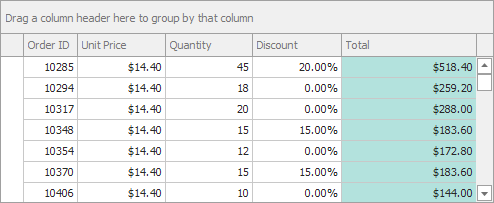ColumnView.CustomUnboundColumnData Event
Fires for all cells of visible unbound columns. Allows you to manually supply data to these cells, and save values entered by users at runtime.
Namespace: DevExpress.XtraGrid.Views.Base
Assembly: DevExpress.XtraGrid.v23.2.dll
NuGet Packages: DevExpress.Win.Grid, DevExpress.Win.Navigation
Declaration
Event Data
The CustomUnboundColumnData event's data class is CustomColumnDataEventArgs. The following properties provide information specific to this event:
| Property | Description |
|---|---|
| Column | Gets the unbound column currently being processed. |
| IsGetData | Inherited from UnboundColumnDataEventArgs. |
| IsSetData | Inherited from UnboundColumnDataEventArgs. |
| ListSourceRowIndex | Gets the current row’s index in the data source. |
| Row | Gets the currently processed row. |
| Value | Inherited from UnboundColumnDataEventArgs. |
| ValueType | Gets the type of data stored in the unbound column. |
Remarks
The CustomUnboundColumnData event fires only for visible unbound columns. It fires in two cases:
When the Grid Control is loaded, it raises the CustomUnboundColumnData event to populate unbound columns. The event’s IsGetData parameter returns true, and the IsSetData parameter returns false. Assign a custom value for the currently processed cell to the event’s Value parameter.
When a user changes an unbound column’s cell data. In this case, the event’s IsSetData parameter returns true, and the IsGetData parameter returns false. Read the Value parameter to get the modified cell value, and save this value to a source.
For a column that owns the currently processed cell, use the CustomColumnDataEventArgs.Column parameter. To identify the row, use the CustomColumnDataEventArgs.ListSourceRowIndex or CustomColumnDataEventArgs.Row parameter.
Note
If you need to get or set specific cell values while handling the CustomUnboundColumnData event, use methods provided by the bound data source. The event’s Row and ListSourceRowIndex parameters allow you to identify the current data row. To get values in a specific row in the data source, you can use the ColumnView.GetListSourceRowCellValue method or methods provided by row objects.
Note
The CustomUnboundColumnData event fires for each cell. However, due to the Grid control’s data processing algorithms, this event may fire multiple times for each cell. The grid control does not cache data you supply on the CustomUnboundColumnData event. If these data operations take too long, you need to manually cache data.
This event allows you to supply cell values only. Your CustomUnboundColumnData event handler must not dispose of the control’s data source, or modify column settings, the control’s layout and the object model.
Note
Server Mode does not support sorting, grouping, filtering, and summary calculation for unbound columns that receive cell values on the CustomUnboundColumnData event. These features are still supported for unbound columns that are populated with expressions (see GridColumn.UnboundExpression).
Refer to the Unbound Columns topic for more information.
Example 1
In the following example, it is assumed that the Grid Control is bound to a table that contains the “Quantity”, “UnitPrice”, and “Discount” columns. The code below adds an unbound column that calculates the total order amount according to the following expression: Quantity * UnitPrice * (1-Discount).

using DevExpress.XtraGrid.Views.Base;
using DevExpress.XtraGrid.Views.Grid;
using DevExpress.XtraGrid.Columns;
private void Form1_Load(object sender, EventArgs e) {
// ...
gridControl1.ForceInitialize();
// Create an unbound column.
GridColumn unboundColumn = gridView1.Columns.AddField("Total");
unboundColumn.VisibleIndex = gridView1.Columns.Count;
unboundColumn.UnboundDataType = typeof(decimal);
// Disable column edit operations.
unboundColumn.OptionsColumn.AllowEdit = false;
// Specify format settings.
unboundColumn.DisplayFormat.FormatType = DevExpress.Utils.FormatType.Numeric;
unboundColumn.DisplayFormat.FormatString = "c";
// Customize appearance settings.
unboundColumn.AppearanceCell.BackColor = Color.FromArgb(179, 226, 221);
}
// Return the total amount for a specific row.
decimal getTotalValue(GridView view, int listSourceRowIndex) {
decimal unitPrice = Convert.ToDecimal(view.GetListSourceRowCellValue(listSourceRowIndex, "UnitPrice"));
decimal quantity = Convert.ToDecimal(view.GetListSourceRowCellValue(listSourceRowIndex, "Quantity"));
decimal discount = Convert.ToDecimal(view.GetListSourceRowCellValue(listSourceRowIndex, "Discount"));
return unitPrice * quantity * (1 - discount);
}
// Specify data for the Total column.
private void gridView1_CustomUnboundColumnData(object sender, CustomColumnDataEventArgs e) {
GridView view = sender as GridView;
if (e.Column.FieldName == "Total" && e.IsGetData) e.Value =
getTotalValue(view, e.ListSourceRowIndex);
}
Example 2
GridView does not cache values of an unbound column, because it is impossible to determine when the cache should be cleared automatically. GridView displays only values supplied by the CustomUnboundColumnData event. So, to display a specific value in a cell, you need to pass a corresponding value to the e.Value parameter based on the processed column and row. What you return as the e.Value parameter is what is displayed in GridView. Each time a cell needs to be updated, the CustomUnboundColumnData event is called.
This example demonstrates how a simple caching mechanism can be implemented. In this project, you can manipulate GridView data (for example, sort, delete, and add records). This is because values of the ID column are used as key values. This column is read-only and contains only unique values, so rows can always be identified.
You can also use the GridColumn.UnboundExpression property to specify an unbound expression. Please refer to the Unbound Columns help topic for additional information.
using System;
using System.Collections.Generic;
using System.ComponentModel;
using System.Data;
using System.Drawing;
using System.Text;
using System.Windows.Forms;
using DevExpress.XtraGrid.Columns;
namespace WindowsApplication1
{
public partial class Form1 : Form
{
private DataColumn _KeyField;
private DataTable _Tbl;
private MyCache _Cache = new MyCache("ID");
private DataTable CreateTable(int RowCount)
{
_Tbl = new DataTable();
_KeyField = _Tbl.Columns.Add("ID", typeof(int));
_KeyField.ReadOnly = true;
_KeyField.AutoIncrement = true;
_Tbl.Columns.Add("Name", typeof(string));
_Tbl.Columns.Add("Number", typeof(int));
_Tbl.Columns.Add("Date", typeof(DateTime));
for (int i = 0; i < RowCount; i++)
_Tbl.Rows.Add(new object[] { null, String.Format("Name{0}", i), 3 - i, DateTime.Now.AddDays(i) });
return _Tbl;
}
public Form1()
{
InitializeComponent();
gridControl1.DataSource = CreateTable(20);
CreateUnboundColumn();
}
private void CreateUnboundColumn()
{
GridColumn col = gridView1.Columns.AddVisible("Unbound", "Unbound column");
col.UnboundDataType = typeof(string);
}
private void gridView1_CustomUnboundColumnData(object sender, DevExpress.XtraGrid.Views.Base.CustomColumnDataEventArgs e)
{
if (e.IsGetData)
e.Value = _Cache.GetValue(e.Row);
if (e.IsSetData)
_Cache.SetValue(e.Row, e.Value);
}
}
}
Related GitHub Examples
The following code snippets (auto-collected from DevExpress Examples) contain references to the CustomUnboundColumnData event.
Note
The algorithm used to collect these code examples remains a work in progress. Accordingly, the links and snippets below may produce inaccurate results. If you encounter an issue with code examples below, please use the feedback form on this page to report the issue.